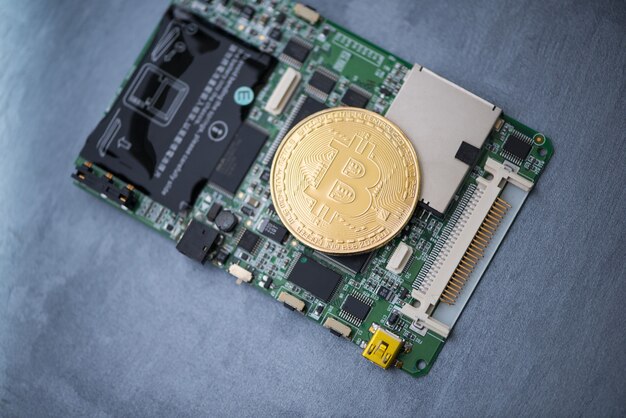The Realities of Bitcoin Mining: How Challenging Is It?
Bitcoin mining has become a hot topic as digital currencies gain traction globally. But for those intrigued by the glowing world of cryptocurrencies, the fundamental question arises: How difficult is it to mine Bitcoin? Let’s delve into this intricate process, unraveling its complexity and uncovering what lies beneath the surface of this digital gold rush.
🚀 Understanding Bitcoin Mining: The Basics
Before diving into the complexity, let's start with the basics. Bitcoin mining is the process by which new bitcoins are entered into circulation, but it's also a critical component of the maintenance and development of the blockchain ledger. It's performed using very sophisticated computers that solve extremely complex computational math problems. Here's a brief overview:
🎯 What Is Bitcoin Mining?
Bitcoin mining is akin to a competitive sport where miners solve cryptographic puzzles to validate transactions and add them to the blockchain. It requires powerful computers and ample electricity to function effectively. But it doesn't just mint new bitcoins—it secures the network, ensuring transactions are safely processed.
🔧 The Technology Behind Mining
At its core, Bitcoin mining enlists the power of computers to handle computations. These computers are equipped with application-specific integrated circuit (ASIC) miners, which are tailor-made for cryptographic calculations. Given Bitcoin's escalating difficulty level, general-purpose computers like laptops or desktops are no longer sufficient.
⏳ Is Mining Bitcoin Still Viable?
Mining Bitcoin isn't as straightforward as it might seem from the outside. It's not just about setting up a powerful machine and watching the profits roll in. Several factors influence the feasibility and profitability of mining operations.
💡 Electricity Costs
A primary concern for miners is electricity, as massive amounts of power are required to operate the sophisticated hardware. Areas with lower electricity costs tend to be more favorable for miners, but even then, balancing the cost against the potential rewards is crucial.
📊 Mining Difficulty
Mining difficulty refers to how hard it is to find a new block to add to the blockchain. Bitcoin adjusts this parameter every 2,016 blocks, approximately every two weeks, to ensure that new blocks are created approximately every 10 minutes. As more miners join the network, the difficulty increases, thus requiring greater computational power and time investments.
🖥️ Hardware Expenses
The ASIC miners used in Bitcoin mining do not come cheap. They require a significant upfront investment and are essential for anyone seriously considering entering the mining space. Regular maintenance and upgrades are also necessary to keep up with the increasing difficulty.
🤖 Factors Influencing Mining Profitability
Determining whether mining Bitcoin is profitable necessitates a keen understanding of several variables. Here's what potential miners need to consider:
💲 Bitcoin's Market Price
The profitability of mining is closely linked with Bitcoin's market price. Sharp fluctuations can drastically affect mining outcomes, either boosting or imperiling profitability.
🌐 Pooling Resources: Mining Pools
Given the significant computational requirements, many miners join mining pools. By pooling resources together, miners enhance their chances of successfully mining a block and sharing rewards according to contributed computational power.
📉 Halving Events
Bitcoin undergoes halving events roughly every four years, reducing block rewards by half. This mechanism is designed to curb inflation by limiting supply. While halving can squeeze miners' profits if Bitcoin prices don’t rise, it also historically precedes price rallies.
🌐 The Global Impact of Mining
Bitcoin mining is not just an individual endeavor; it has global implications, particularly regarding energy consumption and environmental impact.
🌍 Energy Consumption
The vast energy consumption of Bitcoin mining has sparked debates about its environmental sustainability. Resource-intensive and often reliant on non-renewable energy sources, Bitcoin mining is a significant contributor to carbon emissions.
📈 Economic and Geographical Factors
Cryptocurrency-friendly regulations and fiscal incentives can influence where miners choose to base their operations. Countries with favorable climates, low electricity costs, or renewable energy sources are increasingly attractive.
🔹 Opportunities and Challenges in Mining
While Bitcoin mining presents lucrative opportunities, it’s accompanied by challenges that potential miners must tackle.
🎉 Opportunities
Learning and Innovation: For many, the technical challenges of mining present exciting learning opportunities and a chance to be part of cutting-edge technological innovation.
Community Growth: Mining can lead to the growth of communities around shared knowledge and collaboration, fostering a sense of belonging and purpose among miners.
⚠️ Challenges
Volatility and Risk: The crypto market's notorious volatility can turn potential profits into sizable losses at a moment's notice.
Scalability Issues: As more participants enter the space, issues such as network congestion and scalability become increasingly pressing.
🔑 Key Takeaways: Navigating the Bitcoin Mining Landscape
Here are some essential points and tips to understand the nuances of Bitcoin mining:
- Be Energy-Savvy: 🚨 Consider areas with low electricity costs or renewable energy sources to mitigate environmental impact and lower costs.
- Understand Your Investment: 💼 Factor in hardware costs and regularly update your arsenal to remain competitive.
- Stay Updated: 📰 The crypto landscape evolves rapidly; staying informed enables strategic decisions and quick adaptation to changes.
- Join a Pool: 🤝 Collaborate with other miners to increase your chances of success and stabilize income streams.
Mining Bitcoin is an endeavor that, despite its potential rewards, is fraught with challenges ranging from financial investment to environmental concerns. By understanding the intricacies of the process and the factors that influence its success, individuals can make informed decisions about engaging with the Bitcoin mining ecosystem. This balance of innovation, collaboration, and sustainability will define the future trajectory of this remarkable technological endeavor.

